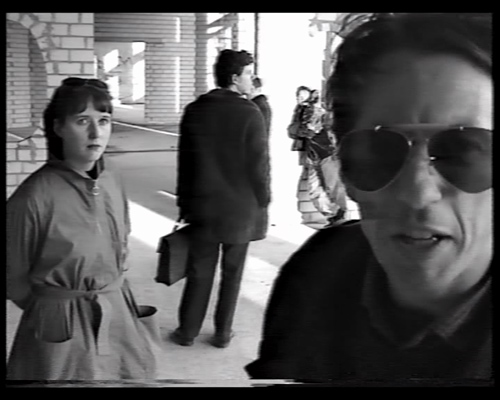|
Stefan Römer
Die gespielte Kunstkritik (Tomorrow is another day), video on DVD, 06.20 min, 1996
Rikrit Tiravaninja was awarded the art prize of a Cologne insurance company which was coupled with a studio residence and the exhibition Untitled (Tomorrow is another day) in the Kölnischer Kunstverein. The exhibition in the Kölnischer Kunstverein was for the most part positively reviewed. The press release stated that the Kunstverein was open to the public 24 hours a day. This was demonstrably not the case. The real situation of exclusions and restricted opening hours was left unanalysed in the all-enveloping party haze of the 1990s. As it emerged that other aspects were also merely claims which the exhibition either failed to match or indeed clearly contradicted, we formulated a critical statement with this video.
Media strategy: It was never our intention to reproduce the images of the exhibition in the Kunstverein, and so for this reason we filmed the fictive discussion in the aesthetic of the epic theatre, with the actors speaking directly into the camera and thus directly confronting the audience. This was the method adopted by Italian neo-realists like De Sica or De Santis: the aim was to dramatise the subject matter by rupturing the filmic illusionism, a breach that in turn agitated the viewers. Our take was also inspired by specific discussion sequences in Fassbinder’s The Niklashausen Journey (1970) and Antonioni’s Zabriski Point (1970). The scene was shot at a significant site of failed planning in Cologne.
Actors: Annette Weisser, Markus Summerer, Stefan Römer; in the background the group Stoffwechsel from Mannheim.
Camera: Stephan Dillemuth
Script: Stefan Römer [1]
[1] Context:
The video collective N-TV produced several video samplers in Cologne between 1993 and 1995. Various cultural practitioners met in Stephan Dillemuth’s flat to watch and discuss videos. The self-produced samplers were sent on VHS tapes to associated groups in Berlin, Hamburg, Vienna and Zurich. The tapes received from the other respective video groups were presented in bars and galleries along with one’s own work.

artists overview
|

